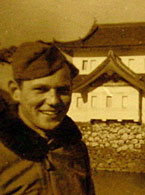
On August 6, 1945, the United States dropped the atomic bomb on Hiroshima, resulting in over 100,000 Japanese casualties. Shortly thereafter, the United States Strategic Bombing Survey sent members of its Morale Division to conduct a series of man-on-the-street interviews across Japan. Their recordings, 366 in total, have been housed in relative obscurity at the National Archives for the past 50 years.
This interview, recorded in December 1945, was the only English-language eyewitness account. The speaker, Kaleria Palchikoff Drago, was a 23-year-old Russian immigrant, whose parents had moved to Japan twenty-four years earlier. She had been living just outside of the city on the day of the bombing.
Recorded in Tokyo, Japan. Premiered August 5, 2005, on All Things Considered.
Kaleria Palchikoff Drago Oral History
Sergei Palchikoff, Kaleria’s father

My father and mother were anti-communists, so we left Russia to run away. The Bolsheviks were right behind us, trying to kill us all. My father, he commandeered a Japanese ship, and he told the captain, Take us.’ And so we all went to Japan sometime in 1921. I was three months old.
It was lovely. My two brothers were born there. We lived on Nagarekawa Street, right in the center of Hiroshima. There was a pond all around the house with beautiful Koi fish in it. It was very comfortable living.
My father, Sergei, was a music teacher for an American mission school. He played seven or eight instruments and taught the violin and cello. The whole of Japan was enjoying his music. He was also an instructor in the Military Academy of Japan.
As soon as the war began my dad got interned and considered a spy, although the military academy fought and said he’s not. After a year, he was released, but we were told by the military police to move to Ushita, in the suburbs of Hiroshima. It was about two and a half kilometers from the city. They thought we would be safer there because of the war. See, the Japanese people always felt some kind of responsibility for the white people. Always, always they regarded the white people as guests in their country, and they made us just as comfortable as they could.
Nikolai Palchikoff, Kaleria’s brother

My brother, Nikolai, had gone to America to study and continue his schooling when he was sixteen. Over there, the military grabbed him and he was sent to the Philippines. Right after the bomb was dropped, he was one of the first American soldiers to set foot in Hiroshima. He got permission to come to the city, where he was born and raised, to look for us. He thought that we had all perished. So he came, and he inspected the place where he was born and the house that stood there. He saw his bed mangled and all the stuff burned.
At the same time that day, dad happened to be down there to look for his colleagues, or to try to find some help in some way. He had to be careful and get out of there real quick. They said the radiation would get him if he stayed for more than two hours. Anyway, so my brother was in the jeep with some of his friends, and he saw my father. He went quickly towards my dad, and the jeep stopped in front of my dad, and my dad was just absolutely startled. Both sides thought that the other side was a vision.
Then my brother put him in the jeep and drove down to meet the family. We were all alive, so that was a great joy. My brother told us not to worry, he’d take care of everything. He arranged for my dad to work for the Americans at the Enlisted Men’s Club as a manager. He got me a job at General MacArthur’s headquarters in Tokyo. I was a secretary. It was my first job. That’s where the United States Strategic Survey interviewed me. And within a few years I was in the United States.
This documentary comes from Sound Portraits Productions, a mission-driven independent production company that was created by Dave Isay in 1994. Sound Portraits was the predecessor to StoryCorps and was dedicated to telling stories that brought neglected American voices to a national audience.

